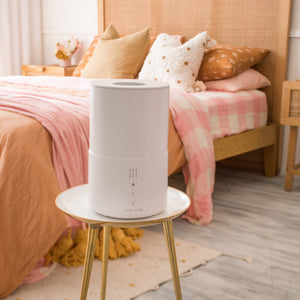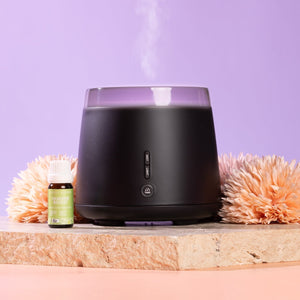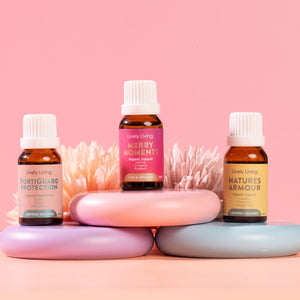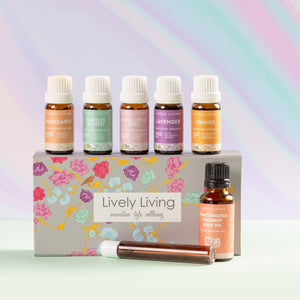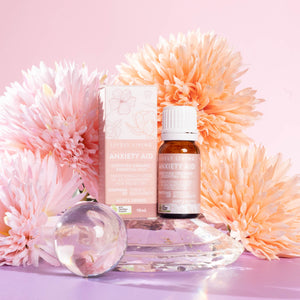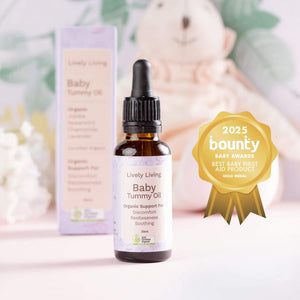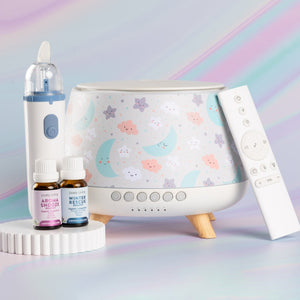Essential Oils for Mould: Natural Remedies to Fight Fungus
Essential oils for mould may not be the first solution that comes to mind when dealing with this common household problem. Yet, these natural remedies pack a punch in their fight against fungi.
The power of essential oils lies in their antifungal properties. Derived from plants, they are nature's way of protecting against mould and bacteria.
Certain essential oils for mould like clove oil or tea tree oil can inhibit growth and even kill existing colonies. This makes them an effective tool in maintaining a healthy home environment.
Table Of Contents:
- The Power of Essential Oils Against Mold
- Top 3 Essential Oils for Killing Mold
- Other Beneficial Essential Oils for Mould Control
- Limitations and Precautions When Using Essential Oils for Mould Removal
- How to Use Essential Oils for Effective Mold Control
- Maximizing Mould Control with Synergistic Essential Oil Blends
- FAQs in Relation to Essential Oils for Mould
- Conclusion
The Power of Essential Oils Against Mould
Essential oils, boasting potent antifungal powers and the capacity to eliminate mold spores, are demonstrating themselves to be a formidable opponent in the battle against domestic molds. But how exactly do these plant-derived compounds work?
The Role of Essential Oils in Plant Immunity
Plants generate essential oils as a way of protecting themselves from potential dangers, like bacteria and fungi. This natural defense mechanism is what makes these extracts effective when combating household molds.
Clove oil stands out among them because it has broad-spectrum antifungal effects that can remove surface mold effectively while also deactivating airborne ones.
Killing Surface Mold vs Deactivating Airborne Spores: The Dual Action Strategy
- Addition of clove essential oil or tea tree essential oil into an ultrasonic aromatherapy diffuser helps release particles into the air which interact with floating mold spores preventing further growth.
Top 3 Essential Oils for Killing Mold
Mold, a common household problem, can be effectively combated with the help of certain essential oils. These natural substances have antifungal properties that inhibit and kill various mold species. Let's delve into three top contenders: clove oil, tea tree oil, and eucalyptus oil.
Clove Essential Oil - The Mold Killer
Clove essential oil, derived from the buds of the clove plant, is known to disrupt cell membranes within mold spores due to its strong antifungal effects. This disruption leads not only to death but also inhibits growth among these harmful organisms.
However, caution should be exercised as high concentrations may cause skin irritation despite being an effective mold killer.
Tea Tree Essential Oil - Purifying Airborne Mold
The native Australian tea tree essential oil possesses potent capabilities in combating airborne mold spores through diffusion methods thanks largely to terpinen-4-ol - its active component which has shown efficacy in killing surface molds too. Though highly beneficial for purifying your space from molds, it does carry a very distinct smell which some people might find overpowering or medicinal-like.
Eucalyptus Oil - Moderate Antifungal Benefits
Rounding up our list is eucalyptus oil offering moderate antifungal benefits against specific types of molds owing primarily to cineole - its primary component. While less potent than clove or tea tree oils when dealing with severe infestations, eucalyptus still plays an important role by preventing further spread and growth via diffusing techniques making it part of any comprehensive plan against molds at home. Remember though synergistic blends like thieves' essential blend combining different types often result in enhanced individual properties leading to better results overall while tackling issues related to molds thereby providing more bang for your buck so to speak.
Don't let mold cramp your style. Clove, Tea Tree, and Eucalyptus essential oils pack a punch against this pesky fungus. While Clove oil disrupts mould cells, Tea Tree purifies the air from spores with its distinct scent. Eucalyptus offers moderate benefits but shines in blends for an antifungal one
Other Beneficial Essential Oils for Mould Control
In the fight against mold, essential oils such as clove and tea tree have been spotlighted due to their potent antifungal properties. However, there are other helpful oils that should be considered when combating mold.
Lavender Oil - Inhibiting Mould Growth
The soothing scent of lavender oil is not its only benefit; it also inhibits both mold growth and sporulation. This double-edged action makes it a worthy contender when dealing with surface molds.
This effectiveness stems from active compounds within the oil which interrupt the life cycle of mold spores, preventing them from maturing into fully grown fungi. Despite these benefits, though, keep in mind that compared to stronger antifungals like clove or tea tree oils, lavender may be less effective on airborne or deeply embedded molds.
Citrus Oils - Potential Antifungal Effects
Beyond refreshing your senses with their invigorating aroma, citrus essential oils possess potential antifungal effects capable of battling certain species of household molds. Lemon and grapefruit essential oils are particularly notable for containing high levels of d-limonene - an antimicrobial compound renowned for combating fungal infections.
Lab tests reveal promising results showing how these citrus-based essentials can inhibit common indoor threats such as Aspergillus niger (black mold) and Penicillium chrysogenum (blue/green mold). Yet despite this promise, more research is required before they're recommended as primary solutions against serious indoor mold problems.
Remember: While individual types of essential oils show efficacy against specific strains of molds under different conditions, combining multiple kinds often yields better results thanks to synergistic blends like thieves' blend where each component enhances others' properties leading to maximum effectiveness.
Limitations and Precautions When Using Essential Oils for Mould Removal
The power of essential oils, such as clove oil or tea tree essential oil, in combating mold growth is undeniable. Be mindful of their restrictions, however. For instance, these oils may not effectively neutralize mycotoxins—potent toxins produced by certain types of molds.
In other words, while they are effective against surface molds (like those found on shower walls), relying solely on them for deep-set mold issues embedded in porous materials like wood or drywall could prove insufficient.
Safety Measures While Utilizing Essential Oils
Besides understanding the strengths and weaknesses when dealing with moldy materials using the top 3 essential oils, including eucalyptus oil, it's also paramount to take safety precautions when handling any type of essential oils. One should never apply undiluted rosemary essential oil directly onto the skin due to its potential irritant nature.
- If you're diffusing citrus oils into your environment using ultrasonic aromatherapy diffusers—or similar devices—it's vital that there's adequate ventilation present. Overexposure through inhalation could lead to potential health risks, especially among individuals who have respiratory conditions.
A Balanced Approach To Mould Control With Essential Oils
An informed approach towards controlling household molds would involve balancing between utilizing powerful allies like lavender oil—known for inhibiting both airborne mold and surface mold—and taking appropriate measures beyond just killing existing colonies. This includes preventing new ones from forming via moisture control methods alongside prompt removal procedures where necessary.
How to Use Essential Oils for Effective Mold Control
Mold can be a pesky problem in many households, but essential oils offer an effective and natural solution. However, to reap the full benefits of these potent plant extracts, it's crucial to use them correctly.
Applying Essential Oil Blend Directly on Surface Mold
The first approach involves the direct application of your chosen essential oil blend onto surface mold. This method requires mixing approximately 25 drops of clove or tea tree essential oil with one cup of water in a spray bottle. After shaking well for proper mixture distribution, generously spray this concoction onto areas affected by mold.
Note that you may need to repeat this process over several days until visible improvement is observed. It's also recommended to test on hidden sections as some oils might cause discoloration on certain materials.
Ultrasonic Diffuser Technique for Airborne Mold Spores
If airborne mold spores are your concern, diffusing antifungal essential oils such as FRESH HOME essential oil blend is another efficient strategy against them. Using ultrasonic cool mist diffusers can maximize their effectiveness because they break down the essentials into tiny particles easily dispersed throughout any room, thus increasing potential impact against airborne moulds.
To do so, add about 5-10 drops each of Tea Tree and Eucalyptus oil (or other preferred antifungal) into your filled-up diffuser, then let it run for around three hours daily, especially where the presence or suspicion of mold exists.
Always remember, though these techniques provide helpful means of combating molds, regular cleaning routines alongside appropriate moisture control measures should not be replaced.

Maximizing Mould Control with Synergistic Essential Oil Blends
The battle against mold becomes significantly more effective when you leverage the power of synergistic blends of essential oils. This approach involves combining different types of essential oils to enhance their individual properties, resulting in better results for killing molds.
A prime example is Protection essential oil blend. Inspired by a group from 15th-century Europe who used similar concoctions while robbing plague victims, this modern-day version typically includes clove oil, lemon oil, cinnamon bark, and rosemary oils.
Unlocking the Power within These Blends
This unique combination offers an array of benefits due to its constituent components. Clove oil has potent antifungal effects that can effectively kill mold; lemon and cinnamon bark are known for their antimicrobial capabilities; whereas rosemary adds another layer of protection against bacteria and fungi.
In essence, these blended oils work together, creating what's termed as synergy - they augment each other's strengths leading to increased overall effectiveness against molds. When combined correctly, these blends not only assist in eliminating surface mold but also prevent airborne spores from developing into new colonies.
Leveraging Protection Oil Blend Against Mould
To harness this powerful blend's full potential against home or office space infestations: add a few drops directly onto affected areas or diffuse using ultrasonic aromatherapy diffusers for broader coverage. Take heed when utilizing this blend, as overuse could cause sensitization, particularly for those with respiratory issues or allergies. You could find detailed guidelines on how best to use your diffuser safely online at various reputable sources like aromatherapy forums, etc. Always remember safety first.
FAQs in Relation to Essential Oils for Mould
What kills mold spores in the air?
Air purifiers and essential oils like tea tree oil, when diffused, can help reduce airborne mold spores. However, complete eradication requires professional intervention.
Does eucalyptus kill mold spores?
Eucalyptus oil has moderate antifungal properties that can inhibit some species of mold growth but may not completely eliminate them.
Does lavender oil stop mold?
Lavender oil inhibits both mold growth and sporulation to a certain extent, making it useful for controlling household moulds.
Will tea tree oil kill mould?
Tea tree oil possesses potent antifungal properties capable of killing various types of moulds on surfaces and reducing airborne mold concentration temporarily.
Conclusion
Essential oils are a natural powerhouse against mould, thanks to their potent antifungal properties. Clove oil, Tea Tree oil, and Eucalyptus oil lead the pack in combating various species of mould.
Lavender and citrus oils also play a significant role in inhibiting mold growth and sporulation.
However, while essential oils can be an effective tool for mould control, they should not replace proper moisture control measures or prompt removal of visible moulds.
If you're ready to harness the power of these remarkable plant extracts for your home's healthiness...
Explore our range at Lively Living! We offer certified organic essential oils along with ultrasonic aromatherapy diffusers that help disperse these beneficial compounds effectively throughout your space.
Visit us today, and let's fight household moulds naturally together!











